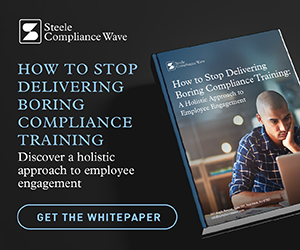2/23/18: Most discussions about bribery of government officials involves the Foreign Corrupt Practices Act, but Michael Allen Braun provides a different lesson for US government contractors as he heads to jail for 18 months. The sentence was for Braun’s conspiracy to commit theft of honest services, wire fraud and bribery of a US public official – not a foreign government official. His co-conspirator,
Compliance Communications Blog
10/6/17: An article posted by Cindy Hofmann on KPMG’s Expert Blog tackles one of the most difficult challenges facing compliance managers of global companies: third-party risk. She offers five steps to identifying and mitigating third-party risk, beginning with getting the right information about third parties. Hofmann’s suggestions include we should all remember (like, “Don’t rely exclusively on English searches” for information). The article is worth reading as a reminder for compliance professionals of what they already know but may not be top-of-mind.
10/6/17: Chief Compliance Officers have enough to occupy their time without worrying that there’s a flashing target on their backs. In an article on the Compliance & Enforcement website of New York University School of Law’s Program of Corporate Compliance and Enforcement, Patty P. Tehrani, Esq. points to a trend of increasing liability for CCOs in the financial sector. Tehrani focuses on several factors that may be contributing to the trend including regulatory expectations and enforcement actions. Fortunately, she also gleans practical lessons that may help compliance professionals remove – or at least lighten – the “targeting trend.”
9/11/17: Sanctions violations aren’t always straight lines. The U.S. Department of the Treasury’s Office of Foreign Assets Control (OFAC) made that clear recently when it designated 10 entities and six individuals for violating the UN Security Council Resolutions and attempting to evade US sanctions against North Korea. The action targets third-country companies and individuals that, among other things, enabled sanctioned North Korean entities to access the US and international financial systems. According to OFAC, “As a result of today’s action, any property or interests in property of the designated persons in the possession or control of U.S. persons or within the United States must be blocked, and U.S. persons are generally prohibited from dealing with them.” The action is a good reminder of the critical importance of knowing your third party associates.
9/11/17: For most companies, it is unthinkable to finance terrorism or human trafficking. But how certain are those companies that they are not providing those funds unknowingly through third parties in their supply chains? In a post on FCPA Compliance & Ethics, Brian Alster, Global Head of Compliance and Supply, Dun & Bradstreet, digs into the issue of third party transparency and compliance. He explores the need to arm corporate procurement teams with the tools needed to ensure visibility “… into every supplier relationship in order to manage those relationships.” The headline of Alster’s post explains why it is worth reading: “Procurement Pressure: The Convergence of Supply and Compliance.”


